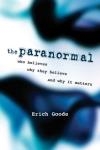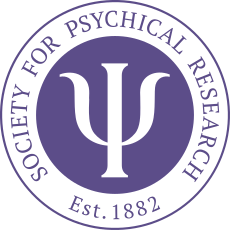
Reviewed by Tom Ruffles
Erich Goode is a sociologist who retired in 2003 from the University of Maryland’s Department of Criminology. The Paranormal is a revised version of his 2000 book Paranormal Beliefs: A Sociological Introduction, a vintage reflected in the date of many of the references. It does not aim to supply answers about the reality of paranormal phenomena, but rather to examine why people believe the things they do. Goode discusses how such beliefs arise and are maintained, despite a culture which prizes scientific rationalism. His analysis has a United States focus, though he does use survey data from other countries. In any case, the points can usually be extrapolated to other western societies to an extent, though he points out that the US is atypical of western societies in the depth of its religious devotion.
The first part of the book describes the popularity of paranormal beliefs, how these differ from the standard scientific approach to handling evidence, and why they are worth studying. He also examines how scientists reason, how this differs from everyday ‘common sense’, and how they employ the criterion of falsifiability in a way that many paranormal adherents do not. He considers paranormal beliefs to be “deviant” as they contravene the predominant epistemological view, but they are psychologically normal (or at least not abnormal).
Part 2 examines a variety of “belief systems”: astrology and psychic predictions, including Nostradamus; creationism; parapsychology, and ufology. Part 3 looks at how the paranormal is embedded in society, religion, the media, and political and social life. The final chapter is a brief overview of how paranormal beliefs satisfy personal needs in a way that science does not, and how they make sense in terms of our misplaced reliance on faulty common sense. These ideas can form a network that needs to be examined holistically; they may seem strange to the majority, such as belief in abduction, but appear logically consistent to the claimant, in this example correlating with a belief in far-reaching government conspiracies.
Goode has a flexible definition of the paranormal and it includes a collection of subjects which few are likely to endorse in its entirety. He distinguishes between paranormalism and pseudoscience, the latter still contrary to general scientific thinking, but not paranormal, such as Bigfoot and the Loch Ness Monster. In principle they could exist, but the evidence is sketchy (much like parapsychology, some would argue, showing how slippery these definitions can be). More doctrinaire sceptics are often quick to dismiss the lot (often accompanied by the derisive cry of ‘woo’) with no further thought, but on the other hand, just as sceptics often fail to distinguish the fine detail of what can loosely be termed paranormal and fringe beliefs, so often also are sceptics seen as cut from the same cloth, when there is an assortment of attitudes within scepticism as well. Goode provides a handy table to distinguish types of paranormal belief, and to help sceptic-spotters identify their quarry in turn. Goode himself is a moderate constructionist, considering that analysing who believes in paranormal claims, and why, is more important than assessing those claims’ validity; that is, refuting paranormal claims is not his primary goal.
He sees scientists as homogeneous, as on the whole they tend to share the same world view. This causes him a problem when assessing the work of parapsychologists, who adopt the same methodological approach as their mainstream colleagues, despite Goode’s opinion that their research is almost certainly flawed, and he does tend to treat it as a separate category to many of the subjects he scrutinises. At one point Goode argues that a “radical revision of contemporary science would be necessary if [creationism], parapsychology, astrology, and the extraterrestrial origin of UFOs were valid”. Apart from lumping in disparate subjects with undoubtedly different degrees of plausibility (for example, creationism would seem to have no scientific merit – and only gets so much coverage here because of its prominence in the US – whereas parapsychology at least allows for meaningful argument), a response might well be: “and your point is?”, because one is put in mind of the timidity Rupert Sheldrake ascribes to contemporary science in The Science Delusion. A bit of radical re-visioning might do scientists some good. It could be argued that they have, or should have, better things to do, but there is the risk of a Type-II error in missing something important that could have benefits for us as a species.
Unsurprisingly, however, Goode finds that in general “the paranormal” does not conform to scientific canons of evidence. He acknowledges that people will have anomalous experiences, but their interpretations go beyond what is justified. They are likely to see cause and effect at play in what sceptics dismiss as chance occurrences, and are subject to a range of well-known cognitive biases. He intersperses the chapters with first-hand accounts taken from a student essay assignment which show how individuals’ beliefs operate as part of a network of assumptions about how the world operates. They may be coherent, at least as far as the holder is concerned, but still erroneous.
While Good makes it clear that he holds a sceptical viewpoint, this is not the debunking tract that might be expected from Prometheus. He does though spend a lot of time arguing that a sociological study of the paranormal is important, which he may not have felt obliged to do for another publisher. He is not dismissive entirely of paranormal claims, and while he covers the usual psychological explanations for belief in the paranormal, he leaves some room for the possibility, however faint he sees it, that the paranormal could be valid. In fact, he is surprisingly critical of the Committee of Skeptical Inquiry (though still calling it CSICOP, which it hasn’t been since 2006), using terms like “self-righteousness” and “sanctimoniousness” in connection with Skeptical Inquirer.
This is a thoroughly readable and insightful book, but despite his subtitle he does not demonstrate convincingly why paranormal belief matters, other than to the person holding it. His conclusion is that as such beliefs meet personal needs, and provide a handy way to interpret the world, science will have a difficult job in showing the convinced that they are wrong. People often use a two-tier system in tandem, he argues, depending on the situation: paranormal-based strategies when the situation is fuzzy and the outcome uncertain, but more conventional methods when clear-cut decisions are required. If something seems to work, then even if the sceptic can convincingly demonstrate that it is wrong there will be no incentive to discard it. Goode seems rather pessimistic about the chances of science, and scepticism, to roll back the tide and build a rational utopia in which no longer do newspapers print astrology columns and idiotic school boards try to adopt Intelligent Design textbooks. The notes may change, but the song remains the same.

